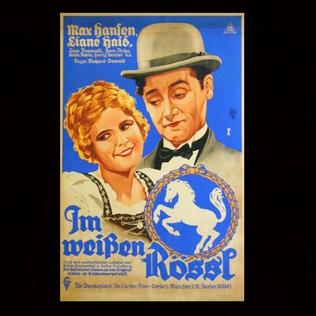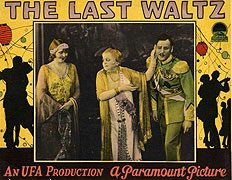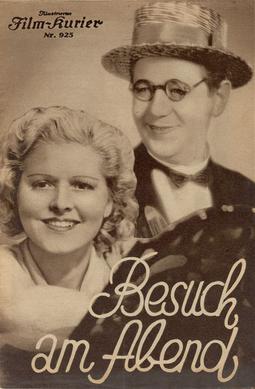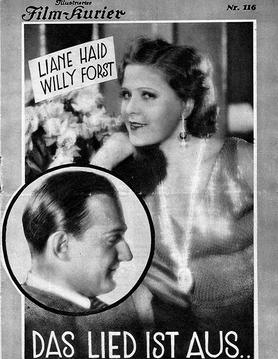Related Research Articles

Juliane "Liane" Haid was an Austrian actress and singer. She has often been referred to as Austria's first movie star.

The Star of Valencia is a 1933 German drama film directed by Alfred Zeisler and starring Liane Haid, Peter Erkelenz and Ossi Oswalda. It was made in Mallorca, at the same time as a French-language version The Star of Valencia directed by Serge de Poligny.

The White Horse Inn is a 1926 German silent comedy film directed by Richard Oswald and starring Liane Haid, Max Hansen, and Henry Bender. It is based on the play The White Horse Inn by Oskar Blumenthal and Gustav Kadelburg.

The Last Waltz is a 1927 German silent romance film directed by Arthur Robison and starring Liane Haid, Willy Fritsch and Suzy Vernon. It was based on the 1920 operetta Der letzte Walzer by Oscar Straus.
The Son of Hannibal is a 1926 German silent film directed by Felix Basch and starring Liane Haid, Alfons Fryland, and Ferdinand von Alten.

Hurrah! I Live! is a 1928 German silent comedy film directed by Wilhelm Thiele and starring Nicolas Koline, Max Gülstorff, and Alexej Bondireff. It was adapted from the play Der mutige Seefahrer by Georg Kaiser.

Vienna, City of My Dreams is a 1928 German silent film directed by Victor Janson and starring Liane Haid, Luigi Serventi and Käthe von Nagy.

The Golden Abyss is a 1927 German silent drama film directed by Mario Bonnard and starring Liane Haid, André Roanne and Hans Albers. It was shot at the Staaken Studios in Berlin. The film's sets were designed by the art directors Andrej Andrejew and Alexander Ferenczy.

An Evening Visit is a 1934 German comedy film directed by Georg Jacoby and starring Liane Haid, Paul Hörbiger and Harald Paulsen.
The Dashing Archduke is a 1927 Austrian-German silent film directed by Robert Land. The film's art direction was by Carl Ludwig Kirmse.
The Island of Dreams is a 1925 German silent film directed by Paul L. Stein and starring Liane Haid, Harry Liedtke, and Alfons Fryland.
Trude is a 1926 German silent film directed by Conrad Wiene and starring Olga Chekhova, Max Landa and Paul Morgan.

Ship in Distress is a 1929 German silent drama film directed by Carmine Gallone and starring Liane Haid, Alfons Fryland, and Gina Manès.

A Woman Like You is a 1933 German comedy film directed by Carl Boese and starring Liane Haid, Georg Alexander, and S. Z. Sakall.It was shot at the Bavaria Studios in Munich and on location in Garmisch-Partenkirchen. The film's sets were designed by the art director Ludwig Reiber.

I Do Not Want to Know Who You Are is a 1932 German comedy film directed by Géza von Bolváry and starring Liane Haid, Gustav Fröhlich, and S.Z. Sakall.

The Song Is Ended is a 1930 German romantic musical film directed by Géza von Bolváry, and starring Liane Haid, Willi Forst, and Margarete Schlegel. A separate French-language version Petit officier... Adieu! was also produced. It was shot at the Tempelhof Studios in Berlin. The film's sets were designed by the art directors Robert Neppach and Erwin Scharf.
I Love You is a 1925 German silent drama film directed by Paul L. Stein and starring Liane Haid, Alfons Fryland, and Anny Ondra.

Tell Me Who You Are is a 1933 German comedy film directed by Georg Jacoby and starring Liane Haid, Viktor de Kowa and Olly Gebauer.
The Slipper Hero is a 1923 Austrian-German silent comedy film directed by Reinhold Schünzel and starring Scott van Balen, Liane Haid and Paul Hartmann. The title is an expression for a hen-pecked husband.

Her Highness the Saleswoman is a 1933 German comedy film directed by Karl Hartl and starring Liane Haid, Willi Forst and Paul Kemp. The film is based on the play My Sister and I by Georges Berr and Louis Verneuil. It was shot at the Babelsberg Studios in Potsdam. Location shooting took place around Lake Constance and Lindau in Bavaria. The film's sets were designed by the art director Werner Schlichting. It premiered in Hamburg and first appeared in Berlin at the city's Gloria-Palast. A separate French-language version The Princess's Whim was also produced.
References
- ↑ Bock & Bergfelder p.181